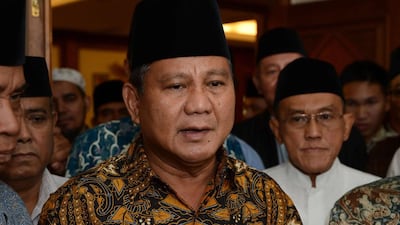If anyone had predicted in 1998 that Indonesia’s president Suharto, the former army general whose autocratic rule had begun 31 years before, would be succeeded by Prabowo Subianto, it would not have seemed wildly improbable. A son-in-law of the late dictator, Mr Prabowo was also a general. When Suharto stepped down that May after riots shook Jakarta, there was speculation that the trouble had been provoked so that either Prabowo or his rival, the head of the armed forces, General Wiranto, could insist on intervening to “save the nation”.
That, 16 years later, there is a good chance that Mr Prabowo will become his country’s next president via democratic means is a huge step forward. If, however, when the electoral commission finally releases the results on July 22 – votes were cast last week, but it takes a long time to tally them in a country of 250 million people and 17,000 islands – he is found to be the winner, what will that say about Indonesians’ attitude towards democracy and their dark decades of dictatorship? The question still applies whoever ultimately prevails in the tightly fought contest between Mr Prabowo and Jakarta governor Joko Widodo, given the former’s closeness to the prize.
Mr Prabowo’s proximity to Suharto is one thing – and it is worth remembering that he was accused of the deaths of up to 500,000 suspected Communists while in power. Suharto was also accused of genocide in East Timor, where more than a quarter of the population perished after his 1975 invasion of the former Portuguese colony; and he was branded the most corrupt world leader of all time by the NGO Transparency International, which estimated he stole up to $35 billion (Dh128bn) from state coffers.
But far from distancing himself from the authoritarian tendencies of his former father-in-law, Mr Prabowo has declared a need for Indonesia to return to the 1945 constitution (which concentrated power in the presidency) and said that direct elections are “not appropriate for us”, because they “do not suit our culture”.
Add to the above that Mr Prabowo has long been dogged by unproven accusations of human rights abuses from his time in the military, and one has to ask: have Indonesians forgotten the past, or has democracy proved so disappointing that they yearn for the certainties of the strongman – which was all they experienced under first Sukarno from 1945 onwards and then Suharto, until the advent of democracy in 1998?
The respected regional commentator Karim Raslan believes that Mr Prabowo has been counting on the latter. He “has hammered the notion that Indonesia needs tegas (or firm) stewardship and that he is the best – indeed the only – player who can provide this”, wrote Mr Karim in a recent column in The Jakarta Globe.
“His message is one that prioritises a stronger state, one that is active in the economy and assertive in foreign affairs. We cannot underestimate the appeal of this message to Indonesians weary of [incumbent president] Susilo Bambang Yudhoyono’s indecisiveness and the current political deadlock.”
Mr Karim also points out that fragmenting power, a feature of the post-Suharto era, has led to a lack of central control. Fadli Zon, a key Prabowo lieutenant, agreed when I met him in Jakarta. “Under Suharto, corruption was centralised. It was only Golkar [Suharto’s puppet party], Suharto’s family and the military. Now corruption has been decentralised – it’s everyone!” Mr Fadli also expressed doubts about how free and fair elections in Indonesia were. “There’s no democracy here,” he said, adding on seeing my expression of surprise: “Over half of all MPs are elected through buying votes.”
But democratic transitions do not follow an inevitable path towards pluralism and a rejection of past patterns of government. There are examples all over the world. In the Philippines, the wife, son and daughter of the late president Ferdinand Marcos (who came second on the list of most corrupt leaders of all time) have been repeatedly elected to office. Kenya’s president, Uhuru Kenyatta, is the son of the country’s former dictator, Jomo Kenyatta. In Europe, Hungary’s populace has elected a party that The Wall Street Journal described as being one of “goulash authoritarianism”.
Christian Caryl, editor of Democracy Lab, a partnership between the London-based Legatum Institute and Foreign Policy magazine, detects a pattern.
“In the course of the past year, demonstrators in Ukraine set out to dislodge the president they voted into office, while protesters in Thailand and Turkey have been taking to the streets against elected leaders who are accused of overstepping their bounds. The word ‘democracy’ means different things to different people. A touch of nostalgia for the old regime among voters in Indonesia suggests that there might be more ambivalence about the democratic transition there than we often realise.”
Ultimately, the question is: how do we react when a relatively new democracy expresses a partial rejection of its recently acquired freedoms and supports a candidate who harks back to some of the certainties of a dictatorial past?
If we believe the proper implementation of democracy is to recognise the will of the people as shown through the ballot box, then we must accept that it is their choice. They may democratically choose a candidate or party whom the liberal West deems overly authoritarian. But that is seeing through a particular prism.
Indonesia is one example of “a foreign country: they do things differently there”. They do indeed; and that includes every state having the right to decide on the kind of democracy appropriate to their own culture. If that means Indonesians have voted for Mr Prabowo as president, so be it.
Sholto Byrnes is a Doha-based contributing editor of The New Statesman


